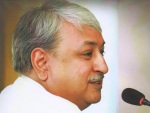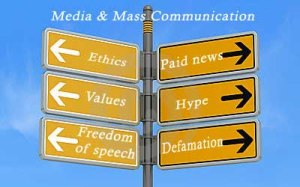Values and Ethics in Media and Mass Communication
Anoop Swarup
Oscar Wilde, the very popular Anglo Irish Dramatist and Poet who lived from 1854 to 1900, more than a century ago, lamented “Nowadays people know the price of everything and the value of nothing”. How true even today, I observed while addressing the distinguished gathering at the Makhanlal Chaturvedi National University of Journalism and Communication at the end of a two day national seminar on Values and Ethics in Media and Mass Communication. I could grasp that there has been an extensive debate and brainstorming on specific values and ethical principles as also a variety of approaches to address the standards of media whether it was radio and TV, film, theatre, the arts, print and now the revolutionary social and digital media, and the internet. Values as perceived by us may differ from an individual’s or societal perceptions and may be absolute or relative but the assumption of which does form the basis for ethical action in a society. Also let us not forget that though principal values may have foundational values it is the physiological values that are more subjective than objective that influence the individuals and the society as a whole and it is the media alone that has a critical role in defining these.
I could see that journalistic ethics do tend to dominate media ethics, almost to the exclusion of other areas perhaps rightly so, as the issue of news manipulation by both the governments and the corporations through censorship and ownership may only just be the tip of the iceberg as there have been more subtle methods of manipulations both voluntary and involuntary across the globe. Ironically enough and much to the chagrin of the masses those being manipulated may not even be aware of it. If I may remind that our freedom in large part depends in continuation of a free press which remains the strongest guarantor of a free society. Obviously we have to be watchful that the truth is never compromised on the edifice of values. Fortunately our founding fathers enshrined these values in the Constitution but it is the truth that shall prevail even in public interest – a term not easy to define that has been much used and abused and may range from public morality to law and order, and from military secrets to seditious behavior.
We should not forget that privacy is a fundamental right that conflicts invariably with rights to liberty, free speech and expression guaranteed under the Constitution. Entertainment and the depiction of violence and sex that borders from sensationalisation to extreme fantasy and compromises, both in terms of ethics and the truth, has now emerged as one of the core issues with the onset of the new media. Virtually every day, on the digital media, be it the Facebook, Twitter, WhatsApp, or the newer applications on the rise, that we witness the paparazzi scandals, the rape episodes and even the fauxtography and morphing episodes that seriously compromise an individual’s privacy. We may cite and derive innumerable examples that were in the limelight, be it the recent gang rape of a Swiss tourist, the Dimapur lynching, and the Nirbhaya case that became a landmark for legislative reform and shook the nations conscience, not to speak of the immense controversy generated globally by Google’s censorship in China, the Charlie Hebdo’s satirical cartoons and the linked terror attack in Paris, Jyllands Posten Muhammad Cartoons in Denmark, Jayson Blair scandal, Adnan Hajj photographs or the sensational slayings by the ISIL, including that of the young Jordanian pilot that went viral on social media or back at home the recent documentary on India’s daughter televised by the BBC and the list goes on.
No wonder the shock and awe value of the audio visual media may always compromise ethics and be in conflict with the law of the land as social and digital media now are in the hands of every individual who have now overtaken even the undercover and investigative reporters who kept the law enforcement agencies on tenterhook till recently. The conflict on issues of perception and confidentiality of news sources with our values and ethics make the exercise of a code of ethics a very complex one for either the Censor Board or the Press Council. Let us not forget that the issuance of a circular notifying the no go words and phrases by the Central Board of Film Certification became a ugly war even among the very members of the Board. Advertising and placement of products in entertainment and news media where huge sums may pass hands to influence perceptions and to create stereotypes is a controversial practice that remains as yet largely unregulated. Negative perceptions as also stereotypes of tastes and taboos in the name of artistic freedom, may promote socially undesirable behavior through the negative portrayal of women, ethnicity and affluence.
It is an irony of sorts, recently a popular Hindi Newspaper Dainik Bhaskar publicly proclaimed ‘no negative news on Mondays’. Let us understand that normative ethics is more often than not about moral values, as in the name of art, media may break with existing norms to shock the audience for better TRP ratings. If we go by the words of Hetherington ‘anything is news if it threatens peace and prosperity’ as we see that now even in our national media, the distinction between news and views does not exist anymore. This is more obvious than ever before as during the prime time on the television, on a channel such as ‘Times Now’ where at times even with Arnab Goswami anchoring the show, the viewers find it difficult to even understand the issues at hand leave alone the news or the views at stake. The overzealous anchors in their rush for better viewership in these highly competitive days do go overboard and make the very critical issues at hand, into a shouting match between the invited parties. Invariably we end up listening only to the views and the statements made by none else but the anchor alone, a constant band of those who are invariably broughton board as experts and the political rivals, whose job is only to defend the indefensible. So we mostly end up either cocked up or vegetating before our TV screens allowing ourselves to be bombarded with a lot of cacophony. Many panel dcussions on TV news channels have reminded me of Shakespeare and his proverbial quote from Macbeth: “full of sound and fury…..signifying nothing.
In a value Orientation survey also known as Schwartz Value Survey sometime back it was revealed that exposure to media – print, visual and internet – is directly linked to the value orientation of individuals and the society at large. Political scientists Ronald Inglehart and Christian Wetzel in their Worlds Value Survey created a scatter plot with values such as traditional ones to more rational ones on Y Axis and the ones such as survival values to self expression and life quality. Interestingly enough India along with south Asia occupied the middle of the graph with the United States at bottom and the protestant world on the diagonal top, whereas the Confucian world was on top of the Y Axis and the Latin American world was more towards the X axis. Thus the media in democracies shares a very critical relationship with the state that changes with time though hallmarked and constitutionally enshrined. Yes, ethical guidelines, regulation and ratings may help the exercise of freedom by individual journalists and the people at large but eternal vigilance is a must for the health of the society and the country. Professor Harold Lasky once commented ‘Eternal vigilance is the price of democracy’. Thus I may mention that good governance by the representatives in a democratic state has to be transparent and accountable and is best safeguarded only by a watchful fourth estate. Let us also be mindful that values do change over time and may vary from societies and cultures but the principal values and ethics are eternal.
With great interest I watched the interview of Justice Markandey Katju, the Chairman of Press Council of India by Karan Thapar. He talked of his disappointment on the negative role of media in India. He asserted that the media was anti-people in an obvious reference to the several episodes of paid news, he felt that the media is also dividing people on communal and religious lines by sensationalizing news such as the desecration of places of worship and above all it is promoting superstitions in a oblique reference to the several television channels promoting astrology and “vaastu” that does not promote scientific temper in society. Quoting Diderot he said that ‘Men will never be free until the last king is strangled with the entails of the last priest’. Yes, India no doubt is in a transition phase from a Industrial society to a post industrial society and from a feudal set up to a modern progressive country where we do need enlightened men with the highest integrity and intellect of the likes of Thomas Paine and Rousseau who had reformed the western world.
We may debate a code of ethics eternally and promulgate a new Regulatory Authority but it is for us as a society that we should never forget what Edmund Burke had to say ‘all that is necessary for the triumph of evil is that good men do nothing’.


No comments:
Post a Comment